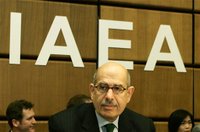Iran Debate Continues
 With the debate over what to do with Iran intensifying by the day, IAEA Director-General El Baradei has just arrived in Teheran in order to assess the situation on the spot.
With the debate over what to do with Iran intensifying by the day, IAEA Director-General El Baradei has just arrived in Teheran in order to assess the situation on the spot.That will be a highly important visit in a number of different respects. His report on the Iranian issue to the UN Security Council, due on April 28, might well be one of the most important document in the realm of international affairs this year.
We should have learnt from the Iraq experience that information from inspections, although not necessarily perfect, are the by far best source on nuclear or other programs. After the UN inspectors left Iraq in 1998, US intelligence was more or less blind about what was happening.
And if things are better now is debatable. US News & World Report today quotes a Member of Congress just having attended a secret briefing on the Iran issue without being overly impressed by the quality of the intelligence available.
But irrespective of this there is no doubt that the Iranians are intending to move forward with some form of nuclear options. You don't need an intelligence agency to see that - it's enough to listen to what they are saying.
They have just celebrated that they have managed to enrich uranium.
Certainly very limited quantities, and most certainly well below anything that would be even remote to what is called weapons grade, but still something that does represent a technological advance on their part.
So it all then boils down to whether this should be accepted or whether there is the readiness to do whatever it takes to stop or at the least slow them down.
El Baradei will certainly do what he can to convince them of ceasing all enrichment activities. But the chances of him succeeding are, realistically speaking, not very large.
And then we are back to the big debate about the military option.
Washington Post today has an interesting column by David Ignatius that looks at some of the big-picture issues that a military strike would be associated with.
Among others, he quotes Zbigniew Brzezinski, the former national security adviser to President Jimmy Carter:
"I think of war with Iran as the ending of America's present role in the world. Iraq may have been a preview of that, but it's still redeemable if we get out fast. In a war with Iran, we'll get dragged down for 20 or 30 years. The world will condemn us. We will lose our position in the world."
That might well be the case. But that's not necessarily an argument that cuts too much ice in the American debate.
Invading additional countries is definitely not an option after the Iraq experience. But the bombing myth is still strong in the political culture. Remember how the Clinton administration used bombing fairly frequently without that causing much of a debate.
So the debate goes on.
The role of El Baradei will be most important.
And voices like those of Zbig Brezinski definitely should be listened to.
It will be a momenteous decision when it comes.


<< Home